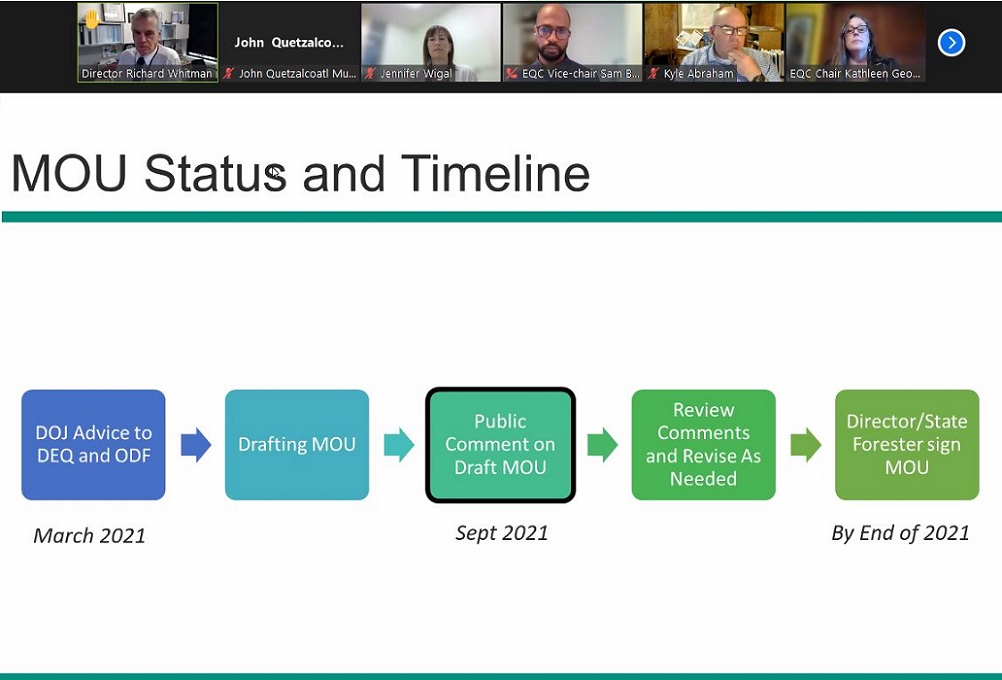DEQ racing against time to save our last remaining salmon
4 min read
With our fisheries in crisis, DEQ is working urgently to improve water quality.
DEQ races against time to save our last remaining salmon. Director Richard Whitman.
[00:00:07] Director Richard Whitman: We are now 23 years after the 1998 adoption of the initial Memorandum of Agreement between DEQ (Department of Environmental Quality) and ODF (Oregon Department of Forestry), and we are now 24 years after the initial listings of salmon as threatened or endangered, and the status of our fisheries— particularly our salmon—continues to decline, particularly in the last year or two, perhaps with the very tough climactic conditions that we have seen here in Oregon. We really are facing a crisis in our fisheries. There really is urgency around this work.
[00:00:53] John Q: He was explaining the agency’s proposed Memorandum of Understanding with the Department of Forestry. The biggest changes have to do with what are known as TMDLs, or, Total Maximum Daily Loads—site-specific plans to measure water quality.
[00:01:09] Director Richard Whitman: And we spent a lot of time today talking about water quality standards, a little bit about TMDLs, and it can all sound very bureaucratic and very dry, but getting this MOU in place and behind us, frankly, and getting the agencies working together in partnership to implement the MOU is of the utmost importance. And that’s why we’re doing what we’re doing.
[00:01:35] John Q: Kathleen George is chair of the Environmental Quality Commission.
Thank you for supporting
local citizen journalism
[00:01:39] EQC Chair Kathleen George: Thank you, Director. The folks who participated in this process know that one of the things I have talked about many times is that sense of urgency and that we have to look and see how many of these TMDLs, you know, do we have, are we implementing water quality management plans?
[00:01:53] John Q: Environmental groups asked for more time to comment. Richard Whitman.
[00:01:58] Director Richard Whitman: They want to understand, you know, if such and such condition exist, then what’s the consequence of that? And part of the reason that there isn’t even more detail in the MOU is because— and I just want to flag this more for the public than even the commission—the conditions in particular basins vary from basin to basin. And so exactly how this gets applied in basins as we do TMDLs is necessarily going to be somewhat basin- specific.
We’re going to need to go through this work and actually do this work in a basin or two or three before people really understand how this relationship between DEQ and the Department of Forestry and others works in the context of our efforts to meet water quality standards.
I know people would love it if we could paint a very detailed picture that gives all of that in advance. But we also need to leave some space for those processes of TMDL development and adoption and implementation plan development and approval for people to engage in the public to engage in those efforts.
And recall that as we go forward, these TMDLs we’re doing will be to an increasing degree, we are proposing that they come before the Commission, not the director, not in a kind of opaque process, but in a very transparent process with the Commission, where you have an opportunity to grapple with some of those specific situations and the public is able to engage in that process also.
This is a first chapter of a new book about how we are going to get to truly clean water in the state of Oregon. And not everything is revealed in the first chapter. We’re going to have to write this book together over the course of the coming years.
[00:04:09] EQC Chair Kathleen George: Thank you Richard for that. I’ll just share one more time my thanks to former commissioner Wade Mosby. Wade was really clear that he wanted to see something really happen here. He, and he felt a sense of urgency. You know, in addition to being a forestry person, he was also a fisherman and he always said, he’d always say, ‘I’m a water guy and we need to do better.’ I think it’s with tremendous respect for his desire that we work together to find a clearer path forward.
And I can just say where I live in the Willamette basin, things are utterly desperate for our salmonid and our lamprey fisheries. They are just utterly desperate. We have two core populations of Upper Spring Chinook salmon that are presumed extinct at this time.
I can say on our little feeder stream to our reservation, Agency Creek, the winter steelhead return is in collapse. It’s in utter collapse. Over the last several years, we’ve had single digit returns. Our most recent year I have data for is 2021. We had six steelhead returning, and I know that there’s a diverse landscape and there’s a diversity of experience across our landscape. But in many places this work is truly urgent. So to see our departments come together, and coordinate our processes to get everybody to work. I just think is commendable. And I think that time is utterly of the essence.
[00:05:30] John Q: DEQ pushes for transparency in the decisions that affect clean water.






